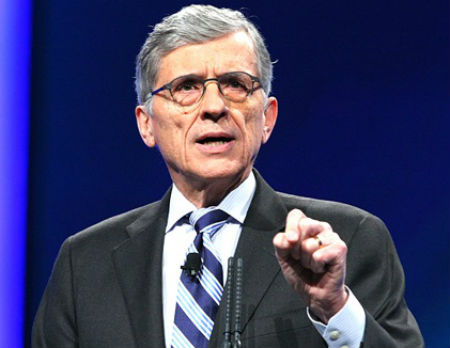Update: Wheeler Has Majority for Charter-TWC: Source
The smarter way to stay on top of the multichannel video marketplace. Sign up below.
You are now subscribed
Your newsletter sign-up was successful

FCC Chairman Tom Wheeler has at least three votes, including his own, to conditionally approve the Charter-Time Warner Cable merger, according to a source familiar with the vote, who confirmed that Democratic commissioner Jessica Rosenworcel and Republican Michael O'Rielly had voted to approve the proposal. O'Rielly's was a partial approval, partial dissent, an FCC source confirmed, but that goes down in the books as a yes.
By day's end, commissioner Ajit Pai, the senior Republican, had voted against the deal, but not because he did not think the two companies should be able to get together.
“The FCC’s merger review process is badly broken," said a Pai spokesperson. "Chairman Wheeler’s order isn’t about competition, competition, competition; it’s about regulation, regulation, regulation. It's about imposing conditions that have nothing to do with the merits of this transaction. It’s about the government micromanaging the Internet economy.”
Commissioner Mignon Clyburn had not voted the deal at midafternoon. If that is still the case, Clyburn has some more time to vote before the majority would rule and approval granted without her vote, though the chairman could grant extra time if she needed it.
Once an item has three votes, it is in "must vote" status, which means the other commissioners have two weeks to vote, plus a week's extension that is customarily granted, then the chairman would have to extend that or it would be de facto approved.
Reuters first reported the two other votes had been cast; Wheeler cast his earlier.
Wheeler circulated the conditioned approval on March 25, which signaled to most he felt he had the votes to approve it. But there had been some pushback from deal critics.
The smarter way to stay on top of the multichannel video marketplace. Sign up below.
What was unclear was how the votes would shake out, including whether or not Wheeler would get five votes--he didn't--and whether or not a Democratic or Republican might balk--at least one did--at approving the deal and how many conditions were put on it.
Clyburn has been lobbied hard for stronger diversity conditions, for example, while another group was expressing concerns about the broadband buildout conditions and the overbuilding that would represent.
Contributing editor John Eggerton has been an editor and/or writer on media regulation, legislation and policy for over four decades, including covering the FCC, FTC, Congress, the major media trade associations, and the federal courts. In addition to Multichannel News and Broadcasting + Cable, his work has appeared in Radio World, TV Technology, TV Fax, This Week in Consumer Electronics, Variety and the Encyclopedia Britannica.

